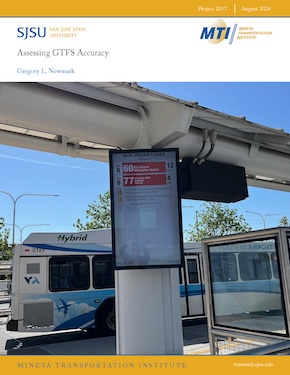- 408-924-7560
- mineta-institute@sjsu.edu
- Donate
Assessing GTFS Accuracy
The promised benefits of the General Transit Feed Specification (GTFS) Schedule and Realtime standards are dependent on the underlying quality of the data. Despite this fundamental reliance, there has been relatively little research on techniques and strategies to assess GTFS accuracy. The need for such assessment is growing as federal and state governments increasingly require transit agencies to make these data available to the public. This research fills this gap by presenting a suite of methods and metrics to assess the temporal accuracy of GTFS Realtime and the spatial accuracy of GTFS Schedule feeds. The temporal assessment demonstrates an approach to collect and clean TripUpdate messages to identify (and derive) a set of values for measuring the accuracy of the vehicle arrival predictions. These metrics are carefully designed to provide transit agencies insight into the quality of the data they provide to customers in terms of the impact of those inaccuracies on the customer experience. The spatial assessment demonstrates an approach to match scheduled information on the location of transit routes and stops with the actual travel patterns demonstrated in the realtime VehiclePosition messages. The measured divergence between the planned and provided transit service yields a series of location accuracy metrics. All of the proposed metrics can be scaled to examine GTFS accuracy from the stop to the systemwide level. All of the proposed metrics can be easily generated from publicly available GTFS feeds without any additional data sources. Finally, all of the proposed metrics can help transit agencies continuously assess and therefore improve the quality of GTFS data they share with the public.
GREGORY L NEWMARK, PHD
Dr. Newmark is an Associate Professor in the Department of Design and Planning in the School of Architecture and Planning at Morgan State University. His research focuses on fostering the sustainability of travel, particularly through transit provision and use. Dr. Newmark seeks to make emerging transit data sources meaningful for policy.
-
Contact Us
San José State University One Washington Square, San Jose, CA 95192 Phone: 408-924-7560 Email: mineta-institute@sjsu.edu






